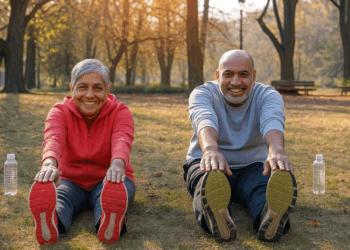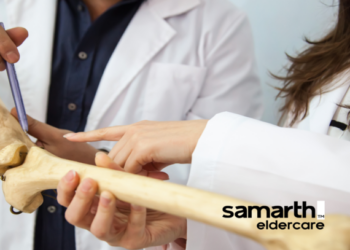As we age, our body undergoes a variety of changes. From kidney failure and coronary heart disease to diabetes and impaired vision, growing old comes with its own set of challenges.
While we take out the time to get screened regularly for conditions such as heart condition and diabetes, a lot of us tend to ignore our bone health. When we think of common causes of concern for the elderly, osteoporosis is probably not one of the first conditions to come to mind.
Bones form the structural framework of our body. Poor bone health can increase the risk of fractures, and as seniors, recovery from a fall can be long and laborious. As we age, our bones tend to lose mass, density and become weak. So, it is no surprise that Osteoporosis and Osteoarthritis are such common problems in seniors, especially women. And these get worse in winters. This is why we believe that bone and joint health screenings are just as important as your regular ones.

Join Now >
Apart from frequent check-ups, some nutrition and lifestyle changes can help you build maintain and restore your bone health, as you age. Here are six vitamins and minerals that you can incorporate into your diet to boost your bone health.
Calcium
Calcium is one of the most important minerals for bone health, and your bones are the main storage site for this vitamin When your body does not get enough calcium from foods and supplements, it takes it from your bones, resulting in them becoming brittle and weak.
Dairy products provide the most calcium per serving size, so ensure you have a healthy intake of cheese, milk, or curd in your everyday diet. Dark green vegetables such as kale, broccoli, bok choy, and okra are also rich in calcium. You also get fortified juices and beverages that you can incorporate into your diet.
Vitamin K
Vitamin K is a fat-soluble vitamin and is known to improve bone density and reduce the risk of osteoporosis, arthritis and other bone-related conditions. It also plays a vital role in wound healing.
Vitamin K can be supplemented in the diet by having green lettuce, kale, mustard greens, parsley, spinach, turnip greens, broccoli, Brussels sprouts, green beans, cauliflower, and cabbage.
Vitamin D
Vitamin D is naturally produced in our body when exposed to sunlight. However, with age, our body loses its ability to synthesize Vitamin D from sunlight. Without sufficient Vitamin D, our bodies cannot efficiently absorb calcium and phosphorus, which are crucial for bone health.
While you can replenish your Vitamin D deficiency by basking in the sun, it is also a good idea to include a few Vitamin D-rich foods such as tuna, mackerel, cheese, soy milk, and eggs in your diet. You can also add fortified packaged foods such as soy milk, cereals, and yoghurt to your meals.
Magnesium
Magnesium is another important mineral that contributes to your bone health. Studies show that people with higher intakes of magnesium have a higher bone mineral density, which is important in reducing the risk of bone fractures and osteoporosis.
To incorporate more magnesium in your diet, include green vegetables such as kale, bok choy and okra in your meals. Also, supplement with nuts and seeds such as poppy, chia, and sesame
Vitamin C
Some studies suggest that Vitamin C also plays an important role in maintaining bone health. It is responsible for the production of collagen in the bone matrix. Vitamin C also oxidises free radicals, which are known to be harmful to bone health.
Moreover, Vitamin C is a powerful antioxidant that helps boost your immunity. You can fulfil your body’s vitamin C requirement by including citric fruits such as oranges and limes in your diet.
Phosphorus
Phosphorus is a common mineral that works with calcium to fortify your bones. Phosphorus is also used by the body to make energy and to carry out several important chemical processes.
Looking to incorporate Phosphorus in your diet? Ensure you include daily products, whole grains, lentils, egg yolks, pork, salmon and tuna.
Along with nutrition, including some level of physical activity, every day is also a great idea. When you have a higher body weight, it exerts extra pressure on your bones and joints with every movement you make. Regular exercise keeps the joints flexible, provides strength to the muscles and add to the support of the joints.









